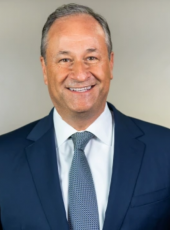Pool Report by Titus Wu, USA Today
| Sent: | Reports: |
| March 2, 2022 16:21 |
Travel Pool Report #1: Columbus, OH Readout Second Gentleman Doug Emhoff, the husband of Vice President Kamala Harris, visited Nationwide Children's Hospital Wednesday to push President Joe Biden's focus on mental health of youth during the COVID-19 pandemic. "I just want to make sure you're taking care of yourselves," said Emhoff to health care workers, as he toured the hospital's Big Lots Behavioral Health Pavilion, the largest behavioral health treatment and research center on a pediatric campus in the United States. Emhoff talked with behavioral health workers about important mental health services being provided and how it was like working in the pandemic. He connected with parents who worried over their children's mental health during COVID-19. His visit comes as nationwide and in Ohio, providers for youth mental health services have seen increased demand as well as increased staffing shortages from the pandemic. He was joined alongside by Carole Johnson, administrator for the Health Resources and Services Administration, the agency overseeing grants and health programs for Americans in underserved communities, and U.S. Department of Health and Human Services Assistant Secretary for Health Admiral Rachel Levine. The mental health and lives of young people has undoubtedly been impacted under the pandemic. Late last year, the American Academy of Pediatrics, the Children's Hospital Association and others declared a national state of emergency in children's mental health. U.S. Surgeon General Dr. Vivek Murthy had also issued an advisory on the issue in December. "Even before the pandemic, an alarming number of young people struggled with feelings of helplessness, depression, and thoughts of suicide — and rates have increased over the past decade," said Murthy. "The COVID-19 pandemic further altered their experiences at home, school, and in the community, and the effect on their mental health has been devastating." In central Ohio, where Nationwide is located, children's experiences have been no different. Many schools had swung back and forth between in-person and remote learning, and the virus's economic fallout has affected many low-income households. All this has coincided with severe staffing shortages hitting the state's behavioral health system, like they have with all sectors of the job market. The Ohio Council of Behavioral Health and Family Services Providers said in a December report that the system "is at its breaking point." Roughly 98% of providers surveyed in the state reported difficulty in hiring new staff and 88% had a hard time retaining workers, the report said. Vacancies have been left unfilled for up to 46 days or more. At the same time, demand for youth health services has increased, but with limited staff, wait times for more than 60% of youth mental health service providers have increased. Nationwide has not been immune to the resulting pressures of this, workers told Emhoff during his visit. "This has been a stress on all of us," said Dr. Eric Butter, chief of the division of psychology at Nationwide Children's Hospital. "There hasn't been one decision over the last couple years that didn't involve COVID in some way." The federal government is trying to combat the staffing burnout. It recently provided $103 million in recent grants to fund programs to help mental wellness with health care workers across the nation. Nationwide received a portion totaling $2 million to train pediatricians and residents to "develop resiliency" and for workers to recognize the important of mental health themselves, Dr. John Mahan told the second gentleman. |
Doug Emhoff, Second Gentleman Pool Reports of March 2, 2022 Online by Gerhard Peters and John T. Woolley, The American Presidency Project https://www.presidency.ucsb.edu/node/354763

